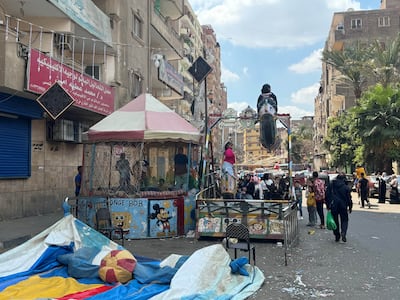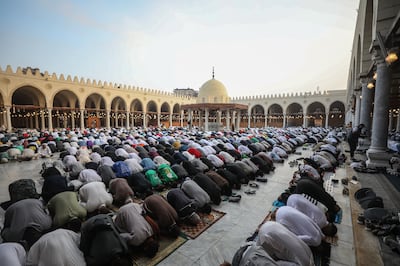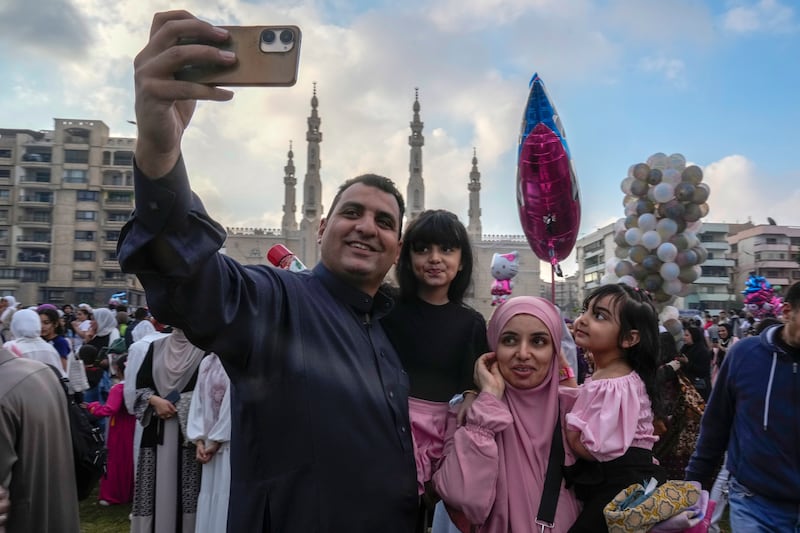Festivities for the three-day Eid Al Fitr feast, which Muslims celebrate to mark the end of Ramadan, are markedly subdued this year in Egypt amid record high costs of living.
While crowds of Muslims visited Cairo’s largest mosques for the communal Eid prayer at dawn on Wednesday, the city’s streets and squares quickly emptied as many returned home to mark the occasion more frugally.
“The prayer was once just the first part of a long day of visiting family, taking the kids out to a fair in their new clothes, but this year it really is the only kind of celebration that I will be able to afford," said Safaa Youssef, a 48-year-old mother of three who lives in Al Shorouk, 33km east of Cairo.
"It almost makes me feel grateful that mosques are still free."
Another important feature of Eid Al Fitr in Egypt is the baking of ghee-based biscuits, or kahk, often sprinkled with powdered sugar or stuffed with various kinds of nuts and dates, or Turkish delight, boxes of which Egyptian households typically give to friends and family.
However, due to high prices of ghee, sugar, flour and other fillings, Ms Youssef made only a small batch for her own family and did not share with her neighbours.
“I could only afford 2kg each of sugar, flour and ghee, so I just made a small batch to make the children happy when they came home from prayer. They were a little disappointed this year because they didn’t get new clothes, so I wanted them to have something sweet,” said Ms Youssef.
Many poorer families in Egypt could only afford giving their children either the customary Eideya, a cash payment from a family’s elders to its young members, or buying them new clothes, she said.
While some, such as Ms Youssef, opted to not purchase clothing due to more pressing expenses, many others headed to Cairo’s largest markets, Wekalet El Balah, for used and wholesale items, to buy new Eid outfits at a cheaper price than shops in Cairo’s other neighbourhoods.
The market, known as a place for decent second-hand items, was bustling with shoppers during the week before Eid as shoppers descended to buy new clothes on a budget.
“I bought this entire outfit I am wearing from Wekalat El Balah for 300 pounds ($6.31),” said Ahmed Ihab, a resident of Cairo’s Al Zawya Al Hamra district, who on Wednesday was among a group of young people standing by a funfair set up for Eid. "If I had bought it from the stores in my neighbourhood, I would have paid at least 1,000 pounds, without the new sneakers. There were so many people down there. You couldn't see the ground through the crowd."

In Cairo's more central neighbourhoods, such as Al Zawya Al Hamra, there were swings in the streets, the odd candy floss stall and horse rides. However, in Cairo’s more remote areas, such as Al Shorouk, residents like Ms Youssef made do with the morning outing to the mosque for prayer.
Eid celebrations are common at larger mosques in Cairo where the country’s poorest are often given charitable gifts such as kahk, fireworks or even cash.
“This year, the mosque in our area gave out large balloons to the children and when they popped them, bank notes of five, 10 or 20 pounds fell out. It was a really nice surprise!” said Noura El Refaey, 41, of Cairo’s El Talbia district.
“A toy store in our area also timed its opening for the first day of Eid and they played music and had characters dressed in costumes dancing outside, so I took my four children there today and we drank cola and watched the festivities.”
While Egyptians might usually visit larger theme parks and spend the day lounging in the grass or riding on the big wheel, this year many such parks are closed.

Amid an increase in the price of public transport following a recent surge in fuel prices, most Egyptians have chosen to stay in their own neighbourhoods.
“This Eid, I am mostly worried to be honest," said Ms Youssef. "I am not able to relax. I don’t want to make the young ones unhappy by telling them to stay home, but I have a daughter who is preparing for marriage and I can’t in good conscience go out and get my hair done, or buy new clothes, when she needs that money to have a happy life and secure a future."
Barber shops and hair salons, known for being busy during the Eid break, typically stay open through the night on the last day of Ramadan because of the long queues of people wanting to get a haircut to go with their new outfits.
This year, many barbers closed early on Tuesday night on account of the low turnout, said Yasser Ghareeb, a barber in Cairo’s Hadayek Al Qubba district.
“This year is by far the lowest turnout I have ever seen during an Eid break in my 20 years of doing this job,” he said. "Last year was pretty low, but this year is even lower. But I expected it. I had just raised my prices because my operation costs have been going up and things aren’t great for many right now, so the first thing they will forego is their haircut."






